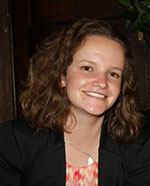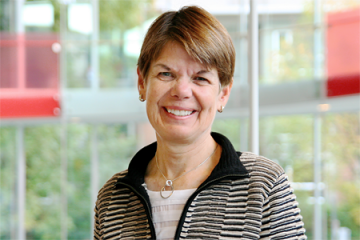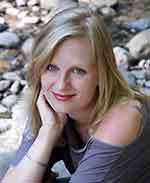New Student Services Officer-Amy Villablanca
 Amy joined the department in September having recently completed her Master of Archival Studies here at UBC. Originally from the UK, Amy has lived and worked around the world including the US and Australia before coming to Canada 2 years ago. She has held student services positions at the Sotheby’s Institute of Art, London and the University of New South Wales, Sydney. Amy’s favorite things to do to relax include running in Pacific Spirit Park, hiking with her dog, Ziggi, and reading a good book. Her favorite food is curry and favorite drink is tea and if she won the lotto she would travel around the world and never stop!
Amy joined the department in September having recently completed her Master of Archival Studies here at UBC. Originally from the UK, Amy has lived and worked around the world including the US and Australia before coming to Canada 2 years ago. She has held student services positions at the Sotheby’s Institute of Art, London and the University of New South Wales, Sydney. Amy’s favorite things to do to relax include running in Pacific Spirit Park, hiking with her dog, Ziggi, and reading a good book. Her favorite food is curry and favorite drink is tea and if she won the lotto she would travel around the world and never stop!
Physical Therapy CPD Coordinator-Janet Lowcock
 The Engine and the Passenger: A view of Lifelong Learning
The Engine and the Passenger: A view of Lifelong Learning
The bicycle is a curious vehicle. Its passenger is its engine.
John Howard, US Olympic cyclist
I am struck by a similarity between cycling and professional lifelong learning. Both the cyclist and the learner are transported, improve their capability, move toward a goal and are often rewarded with the glow of accomplishment, even excitement. But personal effort is required. The bicycle becomes our tool, our means of conveyance, part of our being. As physiotherapists, we embark on the short jaunts or long hauls of continuing professional development. We each need the right kind of vehicle, one that fits, is affordable and is effective.
My entry into the world of continuing professional development happened without hesitation shortly after graduation from my entry-level BScPT program at Queen’s University. I had a sense of wanting to sink my teeth into one area of clinical practice, but had not yet defined that area. A timely phone interview (“When can you start?”) landed me at the Health Sciences Centre in Winnipeg where I was immediately encouraged to become the secretary of the Manitoba Branch of CPA (“Can you take minutes?”) and to take any course available. Local course offerings were few at the time but I was among a community of dedicated physiotherapists who rolled up their sleeves to organize and champion learning opportunities. I benefited from a workplace culture which allowed time for structured and unstructured learning. Many of us took part in organizing the courses we wanted to take, were encouraged to share what we had learned and to operationalize that learning in our clinical practice.
Orthopaedic manual therapy courses were popular and available, but more importantly to me, offered a system of course work and clinical mentoring which led to post professional clinical credentialing. There were few manual therapy instructors and a growing interest in content, so those of us who earned our Part A and Part B certificates (the precursor to today’s Diploma in Manual and Manipulative Physiotherapy) in the mid 1980’s had tremendous opportunities to teach both nationally and internationally. I had found my physiotherapy home.
Over the 30 years since I taught that first course, the profession and our course system has matured, embraced emerging evidence, technology and international standards of program content, evaluation and instructor development.
Manual therapy was identified as one area of physiotherapy practice where skill and knowledge were attained on a continuum from entry level university programs through to post professional education and, more recently, clinical masters level programs. I was invited, as an Orthopaedic Division instructor, to teach one of the two fourth year orthopaedic courses offered in the UBC BPT program. The course TAs was also instructors in the Orthopaedic Division and became our successors as UBC instructors. Other mid- career highlights were private practice ownership, leadership roles in the BC Association of Physiotherapists in Private Practice, fee negotiation for PABC and chairmanship of the Chief Examiners of the Orthopaedic Division of CPA. In 2010, I completed the Master of Clinical Science (Manip. Therapy) at the University of Western Ontario.
In this late career stage I take on the new role of Physical Therapy CPD Coordinator, created out of a shared vision of the Department of Physical Therapy, the College of Physical Therapists of BC, the Physiotherapy Association of BC and the Faculty of Medicine, CPD Division. Again, I am among a group of individuals and organizations dedicated to the advancement of physiotherapy through lifelong learning and ultimately to better health and function for patients.
The CPD content and tools of the future will need to fit the learner. As bicycles have changed over time, with more sizes, styles and technical features available, so too will the look and range of our lifelong learning opportunities. I look forward to working with the partner organizations, to help every physiotherapist in BC find the right fit, to be the most powerful and efficient engine for their professional development.
Musculoskeletal Curriculum Coordinator-Natalie Grant
I am very excited to be the new Musculoskeletal Curriculum Coordinator with the Department of Physical Therapy.
My career thus far has been diverse and varied. Following graduation from McMaster University, I began working in Acute Medicine, ICU and Palliative care. I have worked in the Outpatient department at Richmond Hospital, the OASIS Program and as a community therapist with Vancouver Coastal Health. I’ve worked in private clinics, run my own business and now contract with a private home-therapy company (Physio2U). I’ve also had the opportunity to explore my interests in research as a co-investigator in a research project looking at Community-based rehabilitation following total joint replacement. Throughout my career I have been involved with the Department of Physical Therapy at UBC as a tutor in the case-based weeks, a clinical skills assistant in the lab setting and now in the role of MSK Instructor and Musculoskeletal Curriculum Coordinator.
I have been passionate about education for as long as I can remember. One of the real strengths of the McMaster program, as I saw it, was learning “how to learn”. I try to remain curious and remember there are multiple ways to approach any problem as well as multiple solutions. This has helped me explore my interests in physiotherapy and also guides my teaching.
My physio role models talk about defining what it is you enjoy, making physiotherapy (as a career) fit you, and then striking a balance between work and the rest of your life. A very wise friend once asked me if I knew the difference between “juggling” and “balance”. I think I have been a “juggler” for a long time, and it has served me well as I now know that education is where I am happiest. But I am pleased to say I am now starting to find balance.
Outside of work you will find me in the garden or busy in the kitchen – cooking, baking and preserving. I am happy to report my collection of cookbooks greatly outweighs my collection of physiotherapy textbooks.
My perfect weekend would be a family bike ride, hike or kayak trip followed by a meal with friends and enjoying the spoils of my husband’s wine obsession.
